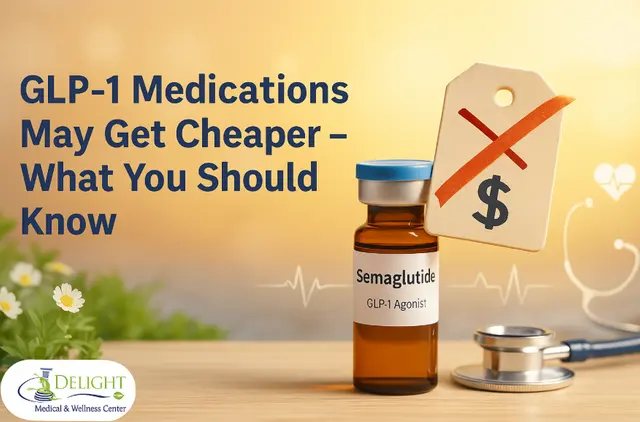GLP-1 Medications May Get Cheaper: What This Means for Weight Loss Patients
November 2025

Introduction: A Shot at Change
We’ve all seen the headlines: Ozempic, Wegovy, Mounjaro, the so-called “miracle weight loss injections.” But if you’ve ever tried to fill a prescription, you know it can feel more like a luxury item than a medical necessity.
The good news is that the federal government has proposed lowering the prices of these GLP-1 medications as part of expanded drug negotiation efforts. Even better, this move could make cutting-edge weight loss and metabolic care more accessible to millions of people.
Before celebrating, it’s important to break down what this really means, especially for patients trying to navigate care now, not just in the future.
What Are GLP-1 Medications?
GLP-1 medications like Semaglutide and Tirzepatide were originally developed to manage type 2 diabetes. Physicians quickly discovered their powerful impact on appetite regulation, weight loss, and metabolic health.
- Slow gastric emptying
- Reduce hunger
- Improve blood sugar control
- Support fat loss, especially visceral fat
These medications have transformed treatment for obesity, insulin resistance, prediabetes, and metabolic syndrome, but one major obstacle remains, the cost.
Why Are These Medications So Expensive?
Brand names like Wegovy and Ozempic can cost $900 to $1,300 or more each month, often without insurance coverage. Because many insurance plans categorize weight loss as a “lifestyle issue,” patients are left paying out of pocket even when their health risks are far from cosmetic.
- Millions are excluded from accessing transformative medications
- Health equity gaps widen as only wealthier patients benefit
- Black-market or unregulated compounding sources emerge
This is where the federal government’s new proposal becomes important.
What Is the Government Doing?
In 2025, the Inflation Reduction Act will give Medicare the authority to negotiate prices on high-cost prescription drugs. GLP-1 medications may be added to that list, which could lead to:
- Lower Medicare pricing
- Ripple effects on private insurance policies
- Increased pressure on drug manufacturers to reduce prices
This may mean better access, lower out-of-pocket costs, and improved insurance coverage for patients. But timing matters.
Proceed with Caution: Dr. Kerendian’s Perspective
As a physician specializing in medical weight loss for over 20 years, I believe the push for affordability is a positive step. Still, there are key insights patients should keep in mind:
1. Lower Prices Don’t Mean Immediate Access
Policies take time. Price reductions may not appear until late 2025 or 2026, and that is a long wait for people struggling with metabolic or weight-related health issues.
2. Not All Versions Are Created Equal
Generic and compounded versions may expand, but not all are high-quality or clinically backed. It is important to work with a physician familiar with reliable and safe sources.
3. Medication Alone Isn’t the Answer
The most successful outcomes happen when GLP-1 medications are paired with comprehensive care, including:
- Metabolic evaluation
- Hormone optimization
- Nutritional and lifestyle planning
- Ongoing support from a qualified medical provider
At Delight Medical, weight loss is treated like a precision science, not just a prescription refill.
4. Long-Term Monitoring Matters
These medications are powerful, but not “set and forget.” Proper monitoring, dose adjustments, and long-term planning prevent side effects and improve results.
What You Can Do Right Now
If the cost of GLP-1 medications has held you back, there are still options. At Delight Medical and Wellness Center, patients can access medically supervised and affordable alternatives through:
- Trusted pharmaceutical compounding partners
- Insurance guidance
- Tailored care plans beyond injections alone
Whether you’re considering Semaglutide, Tirzepatide, Lipotropics, or hormone balancing, personalized guidance is available.
In Summary: The Price Drop Is Coming, but Your Health Can’t Wait
The expected price reductions are encouraging, but you do not need to wait for federal changes to begin improving your health. Whether you are dealing with weight gain, metabolic challenges, or hormonal concerns, help is available now.
- Work with a physician specializing in obesity medicine.
- Follow a plan that addresses more than appetite control.
- Prioritize preventative health today.
FAQs
Will GLP-1 medications get cheaper in 2025?
Yes. Federal negotiations may reduce prices starting in 2025 through Medicare, with possible impacts on private insurance.
Can I get GLP-1 medications if I can’t afford Wegovy or Ozempic?
Yes. Clinics like Delight Medical offer affordable compounded Semaglutide options under physician supervision.
Is Semaglutide safe long-term?
When prescribed and monitored by a physician, long-term use of Semaglutide has a strong safety profile and is approved for weight management.
Want Personalized Weight Loss Guidance?
Call or book your consultation with Delight Medical and Wellness Center today. Serving Los Angeles and virtual patients across California. Visit www.delightmedical.com.


